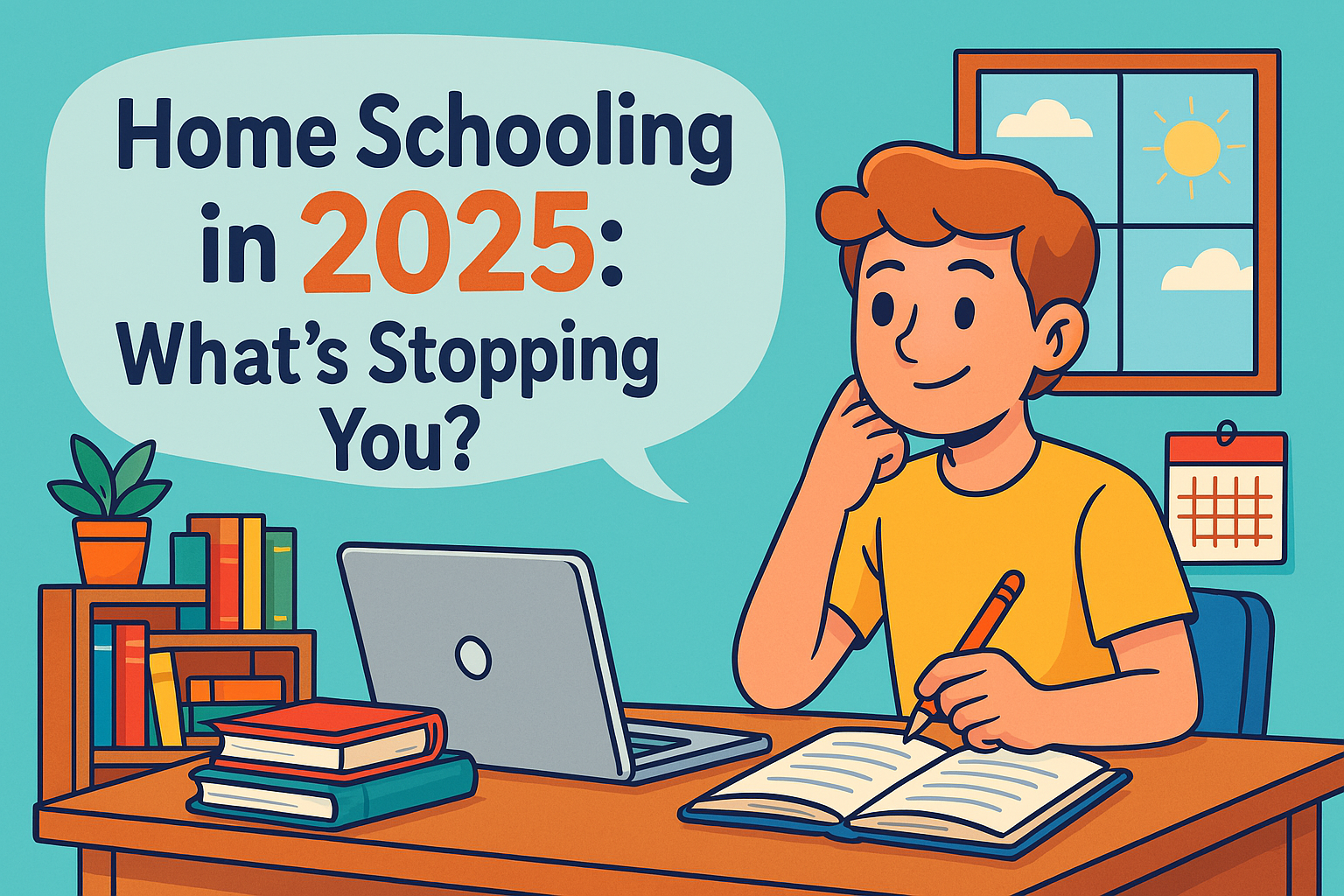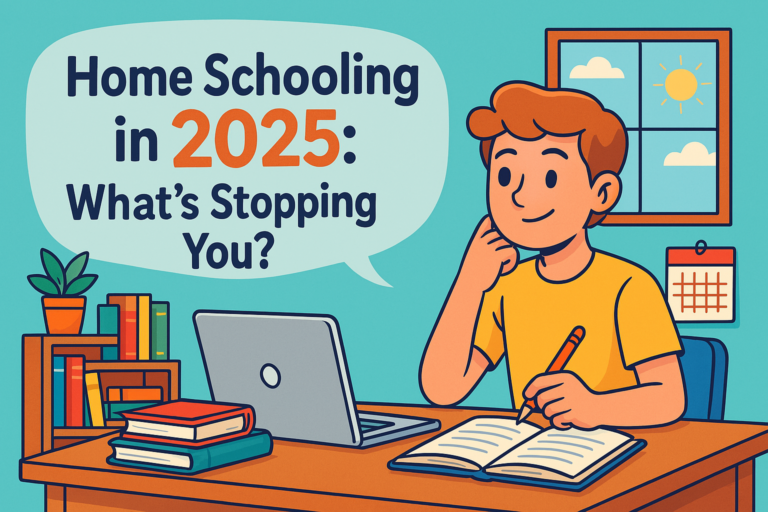Home Schooling in 2025: What’s Stopping You?
Home schooling in 2025 is easier, more flexible, and more popular than ever before. You don’t need to be a qualified teacher, and there’s no need to follow the national curriculum.
Everything you need to get started is free and available online, including government guidance. So if you’re still unsure, the only thing stopping you might be doubt — and this guide will help fix that.
Why More Teens Are Home Schooled in 2025
In 2025, thousands of teenagers across the UK are learning from home—and loving it. The old idea that school is the only place to get a proper education is changing fast. Home education, often called EHE (Elective Home Education), gives young people more freedom, better mental health, and the chance to learn at their own pace.
You can start home schooling at any time. Some teens leave school because they’re struggling with stress, bullying, or feeling left behind. Others never go to school at all and are home educated from the start. Whatever the reason, the law in England, Wales, Scotland, and Northern Ireland supports parents who choose to teach their children at home.
Is It Legal to Home School?
Yes — it’s 100% legal to home educate in the UK. In England, parents have the right to educate their children at home under section 7 of the Education Act 1996. This means you don’t need permission (unless your child is already enrolled in a school), and there’s no requirement to follow the national curriculum.
The UK government explains this clearly on their official site:
There’s no need for expensive tutors or fancy equipment. Most resources are free or low-cost, and you can shape your learning to fit your interests, career goals, or learning style.
What About Exams and Qualifications?
One of the most common worries teens have is, “Will I still get GCSEs or A-levels if I’m home schooled?” The answer is yes — absolutely — but it’s a little different from how it works in school.
You can still take GCSEs as a private candidate. This means you’ll study at home and book your exams through an exam centre. You can choose which subjects you want to study and when to take them. There’s no need to sit 10 subjects if that doesn’t suit your plans. Many home educated teens focus on the core subjects like English, maths, and science, plus a few extras based on their interests or future career path.
But here’s something most people don’t realise — most home educators choose IGCSEs instead of the standard UK GCSEs. Why? Because IGCSEs (International GCSEs) are usually more accessible for home learners. They were originally designed for international students, so they don’t require coursework or practical assessments that must be supervised by a school teacher. That’s a big bonus for home-educated teens who don’t attend a school and don’t have a registered teacher to mark coursework.
IGCSEs are accepted by colleges, universities, and employers across the UK, and are considered equal to regular GCSEs. In fact, exam boards like Cambridge and Edexcel offer IGCSEs in a wide range of subjects, giving you lots of choice. Since they’re exam-only, many families find them more straightforward to manage and easier to book through local private exam centres.
Some home learners even skip GCSEs altogether and go straight into college courses, apprenticeships, or self-employment. As long as you meet the entry requirements — which can vary — it’s possible to move forward without the traditional school route. It’s all about what works best for you.
Do I Need to Follow a Set Curriculum?
Nope. You can create your own learning plan. Some families like to follow a timetable, others take a more relaxed approach. Some use online lessons or tutors, while others learn through projects, books, and real-world experiences.
There’s no right or wrong way to do it. What matters is that your education is “suitable” and prepares you for life. That can include reading, writing, maths, science, coding, cooking, budgeting, or learning a trade. You’re in control.
Need help getting started? Check out this guide:
👉 How to Start Home Schooling in the UK
What If the Local Authority Contacts You?
Sometimes, the local council will contact families to ask about their home education. Don’t panic — it doesn’t mean you’ve done anything wrong. They might want to check that your education is suitable.
You don’t have to invite anyone into your home or show them work samples unless you want to. A written report from your parent or carer is usually enough. Here’s a helpful guide on how to deal with this:
👉 Responding to a Local Authority Home Education Report Request
What a Home Education Week Might Look Like
Here’s an example of a simple home schooling timetable. You can print this out and customise it to fit your goals.
Remember — you don’t have to follow a 9-to-3 school day. You can work in short bursts, take breaks, and focus on the subjects that matter most to you.
| Time | Monday | Tuesday | Wednesday | Thursday | Friday |
|---|---|---|---|---|---|
| 9:00 – 10:00 | English | Maths | Science | Geography | Art / Design |
| 10:00 – 11:00 | Maths | English | Project Work | Science | Media / Film Studies |
| 11:00 – 11:15 | Break | ||||
| 11:15 – 12:15 | History | Computing | Literature | PE / Outdoors | Music |
| 12:15 – 1:15 | Lunch | Lunch | Lunch | Lunch | Lunch |
| 1:15 – 2:15 | Creative Writing | Languages | Art | Careers / Life Skills | Fun Projects |
So, What’s Really Stopping You?
If you’ve been thinking about home schooling but haven’t made the leap, ask yourself: what’s holding me back? Fear of doing it wrong? Pressure from school or friends? Worrying about the future?
The truth is, thousands of home-educated teens are thriving. They’re learning in a way that works for them, discovering what they love, and building a future on their own terms.
Home schooling in 2025 isn’t just an option — it’s a real, exciting path that gives you freedom, flexibility, and power over your own education. So, what’s stopping you now?

